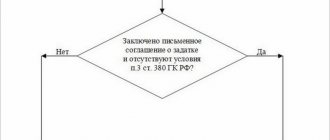Quite often, an accountant on staff of a company is faced with the need to make appropriate deductions from an employee’s accrued salary. In accordance with the nature of this operation, the postings and corresponding accounts will differ significantly, and the actions themselves will have a lot of nuances.
In order to avoid possible mistakes and carry out the withholding correctly in accordance with all the requirements of regulatory documents, we will consider possible situations in more detail.
Classification of deductions
The accountant will need to make appropriate entries in the accounts and withhold a certain amount from the employee's salary in several cases. In the first, the procedure will take place in favor of the company itself. In the second case, the benefit will be a specific individual to whom the worker has any obligations. The third situation dictates the need to collect amounts in case of non-payment of taxes, loans and any other debts to budgetary or commercial organizations. Each of the listed categories should be considered separately, since the case may be highly specific and require an individual approach to make the right decision.
Deductions in favor of the employing organization
In accordance with the Labor Code of the Russian Federation, the employer has the right to return partially or fully the amounts accrued (paid) to the employee if the situation that arises falls into the following categories:
- the employee failed to fulfill the required labor standards within the time allotted for work;
- an error occurred during the calculation and calculation of wages and the amount does not correspond to reality;
- the employee received advance payments, but did not complete his work;
- when performing a business trip, the employee did not fully spend the advance paid to him;
- the employee suffered established damage to the enterprise, which was confirmed and agreed upon;
- the employee was issued a loan, which will subsequently be repaid from the amount of wages due;
- the worker did not return the balance of previously issued accountable amounts;
- the person will be fired before the end of the working year in which he has already received partially or fully paid leave. However, if the reason for dismissal is sufficiently compelling and concerns the employer directly, then the employee has the right to challenge the decision in his favor while maintaining payments.
It is also worth noting that retention can be recognized as legal only if the employee himself confirms the reason for it, and the period for returning voluntarily is no more than 1 calendar month. If at least one of these two conditions is not met, then the whole situation comes under the control of the judicial authorities.
When an employee is released from liability
There is no legal basis to deduct damage from the subordinate’s income in the examples below:
- there is no basis for ensuring the safety of things for which the employee is responsible. It is always the fault of the management if it has not provided the proper level of alarm and security, and if the warehouses and locks do not meet the standards;
- force majeure, natural disasters, military and armed conflicts, that is, everything from which a person must save his life, and not take away valuables;
- natural loss rates and normal business operations.
Examples of accounting entries for deductions in favor of the employing organization
- Dt 20 Kt 70 wages accrued to employees of the company’s main production;
- Dt 70 Kt 68.2 withheld personal income tax;
- Dt 70 Kt 73.2 a deduction was made for material damage caused by an employee of the organization in connection with the established financial liability;
- Dt 70 Kt 73 the shortfall in the issued accountable amounts is withheld from the wages of the perpetrator;
- Dt 70 Kt 73.1 the amount of the loan issued to the employee by the organization was withheld;
- Dt 70 Kt 50 advance payment of wages paid for half a month is withheld.
Accounting
As a general rule, in accounting, the amount of deductions at the request of an employee should be reflected in the entry:
Debit 70 Credit 76
– payments are withheld from wages at the initiative of the employee.
An example of reflecting in accounting deductions from an employee’s salary on his initiative. The organization applies a general taxation system
According to the statement of the manager of Alpha LLC A.S. Kondratiev is deducted 900 rubles from his salary every month. and is transferred to his personal account to the mobile operator. Kondratyev’s monthly salary is 16,000 rubles. Kondratiev has no rights to deductions for personal income tax. Alfa charges insurance premiums for pension (medical, social) insurance at the general rate. The organization pays contributions for insurance against accidents and occupational diseases at a rate of 0.2 percent.
Alpha's accountant makes the following monthly accounting entries:
Debit 26 Credit 70 – 16,000 rub. – Kondratiev’s salary was accrued;
Debit 26 Credit 69 “Settlements with the Pension Fund” – 3520 rubles. (RUB 16,000 × 22%) – pension contributions are accrued to finance the insurance pension;
Debit 26 Credit 69 subaccount “Settlements with the Social Insurance Fund for social insurance contributions” – 464 rubles. (RUB 16,000 × 2.9%) – social insurance contributions are accrued;
Debit 26 Credit 69 “Settlements with FFOMS” – 816 rubles. (RUB 16,000 × 5.1%) – contributions for health insurance to the Federal Compulsory Medical Insurance Fund have been accrued;
Debit 26 Credit 69 subaccount “Settlements with the Social Insurance Fund for contributions to insurance against accidents and occupational diseases” - 32 rubles. (RUB 16,000 × 0.2%) – premiums for insurance against accidents and occupational diseases have been calculated;
Debit 70 Credit 68 subaccount “Personal Income Tax Payments” – 2080 rubles. (RUB 16,000 × 13%) – personal income tax was withheld from Kondratiev’s salary;
Debit 70 Credit 76 – 900 rub. – money was withheld from Kondratyev’s salary at his request;
Debit 70 Credit 50 – 13,020 rub. (16,000 rubles – 2080 rubles – 900 rubles) – Kondratiev’s salary was issued from the cash register;
Debit 76 Credit 51 – 900 rub. – money is transferred to the telecom operator.
An example of how deductions from an employee’s salary are reflected in accounting to repay a loan issued by an organization
On June 30, Alpha LLC provided its manager A.S. Kondratiev received a loan in the amount of 48,000 rubles. for the purchase of a car.
The loan was provided for 12 months at 13 percent per annum. According to the agreement, interest for the use of borrowed funds is accrued from the day following the day the loan is issued and is paid monthly until the debt is repaid. The employee repays the debt monthly in equal installments. The accountant withholds the amount of debt and interest from Kondratiev’s salary.
The interest rate under the loan agreement (13 percent) exceeds 2/3 of the refinancing rate in effect on the date the employee paid interest on the loan. Therefore, Kondratiev does not receive any material benefit from the loan.
Kondratiev’s monthly salary is 30,000 rubles.
From his salary for July, the Alpha accountant withholds: 48,000 rubles. : 12 months + 48,000 rub. × 13%: 365 days. × 31 days = 4529.97 rub.
The following entries were made in the organization's accounting records.
In June:
Debit 73 Credit 50 – 48,000 rub. – a cash loan was issued to Kondratiev;
In July and subsequent months of the loan agreement:
Debit 73 Credit 91-1 – 529.97 rub. – interest accrued for the use of borrowed funds;
Debit 70 Credit 73 – 4529.97 rub. – the employee repaid part of the loan and interest for using it.
Reflect the deduction of additional insurance contributions to the Pension Fund of the Russian Federation to finance the funded pension by writing:
Debit 70 Credit 69 subaccount “Settlements with the Pension Fund for funded pension”
– insurance premiums are withheld from the employee’s salary.
When transferring contributions, make the following entry:
Debit 69 subaccount “Settlements with the Pension Fund for funded pension” Credit 51
– insurance contributions to the Pension Fund of the Russian Federation are listed.
This conclusion follows from the Instructions for the chart of accounts.
An example of reflecting in accounting deductions from an employee’s salary of additional insurance contributions to the Pension Fund of the Russian Federation to finance a funded pension. The organization applies a general taxation system
Employee of Alpha LLC A.S. Kondratyev submitted to the society an application to withhold additional contributions to the Pension Fund of the Russian Federation. The payment amount is fixed – 1000 rubles. per month.
Kondratyev’s monthly salary is 20,000 rubles. Kondratiev has no rights to deductions for personal income tax. Alfa charges insurance premiums for pension (medical, social) insurance at the general rate. The organization pays contributions for insurance against accidents and occupational diseases at a rate of 0.2 percent.
Alpha's accountant makes the following monthly accounting entries:
Debit 26 Credit 70 – 20,000 rub. – Kondratiev’s salary was accrued;
Debit 26 Credit 69 “Settlements with the Pension Fund for insurance pensions” – 4,400 rubles. (RUB 20,000 × 22%) – pension contributions are accrued to finance the insurance pension;
Debit 26 Credit 69 subaccount “Settlements with the Social Insurance Fund for social insurance contributions” – 580 rubles. (RUB 20,000 × 2.9%) – social insurance contributions are calculated;
Debit 26 Credit 69 “Settlements with FFOMS” – 1020 rubles. (RUB 20,000 × 5.1%) – contributions for health insurance to the Federal Compulsory Medical Insurance Fund are accrued;
Debit 26 Credit 69 subaccount “Settlements with the Social Insurance Fund for contributions to insurance against accidents and occupational diseases” - 40 rubles. (RUB 20,000 × 0.2%) – premiums for insurance against accidents and occupational diseases have been calculated;
Debit 70 Credit 68 subaccount “Personal Income Tax Payments” – 2600 rubles. (RUB 20,000 × 13%) – personal income tax was withheld from Kondratiev’s salary;
Debit 70 Credit 69 subaccount “Settlements with the Pension Fund for funded pension” – 1000 rubles. – the amount of additional insurance contributions to the Pension Fund of the Russian Federation is withheld;
Debit 70 Credit 50 – 16,400 rub. (20,000 rubles – 2600 rubles – 1000 rubles) – Kondratiev’s salary was issued from the cash register;
Debit 69 subaccount “Settlements with the Pension Fund for funded pension” Credit 51 – 1000 rubles. – money was transferred to the Pension Fund of the Russian Federation.
Deductions in favor of an individual under writs of execution (alimony)
If an employee of an organization has obligations to pay alimony, then, based on the writs of execution previously received by the company, the required amount will be regularly deducted from the wages due for payment every month. The maintenance of one minor child accounts for 25% of the employee’s income, for two – 33%, for three or more – 50%.
All enforcement documents that were sent to enterprises for the purpose of subsequent deductions must be genuine and executed in a strictly appropriate manner. If the first copy is lost for some reason, then its duplicate, issued by the judicial authority that made the decision to recover funds, will be valid. Each document must be registered, and both the claimant and the bailiff must be notified of receipt.
Features of tax calculation
The main types of income for which personal income tax must be withheld are all kinds of accruals under an employment and civil service agreement. This list includes not only direct wages, but also bonuses, allowances, and some compensation received. Special formulas are used to calculate payments.
However, personal income tax postings are made in the following situations:
- when calculating salaries;
- when deducting tax;
- when issuing wages;
- after transferring the personal income tax amount to the budget.
If an organization has employees who are periodically sent on business trips, they are entitled to appropriate travel allowances, which are also taxed (subject to the legal limit).
So, after deduction of personal income tax, the posting is completed in accordance with the appropriate procedure.
In the situation with travel expenses, several types of postings are provided:
- when issuing an advance to an employee for travel expenses;
- when calculating expenses;
- if personal income tax is assessed on amounts for business trips that exceed the norm;
- After the personal income tax is transferred to the budget, the posting is also done.
If you purchase any services from an individual, you may also need to make tax payments. In this case, the organization must deduct the appropriate amount and provide the seller with funds, taking into account the payment of personal income tax. In such a situation, wiring is also done:
- when the product or service was purchased from an individual;
- posting when withholding personal income tax;
- when transferring personal income tax to the budget;
- when transferring the amount for services or goods to the seller.
When personal income tax has been assessed on the amount, the posting of its deduction and transfer to the treasury is mandatory. After all, entities that transfer income to individuals, as a general rule, simultaneously become tax agents. Accordingly, their responsibilities include withholding and remitting tax payments.
Regulatory regulation
The procedure for holding an employee financially liable for damage caused to the employer is established by Chapter 39 of the Labor Code of the Russian Federation. The employee is obliged to compensate the employer for direct actual damage caused to him (Article 238 of the Labor Code of the Russian Federation).
An employee's financial liability may be:
- limited (Article 241 of the Labor Code of the Russian Federation) - within the limits of the employee’s average earnings;
- full (Article 243 of the Labor Code of the Russian Federation) - in the following cases: the employee is charged with full financial responsibility for damage caused to the employer during the performance of his job duties;
- a shortage of valuables entrusted to the employee on the basis of a special written agreement or received by him under a one-time document was discovered;
- the damage was caused intentionally;
- the damage was caused while under the influence of alcohol, drugs or other toxic substances;
- the damage was caused as a result of the employee’s criminal actions established by a court verdict;
- the damage was caused as a result of an administrative offense established by the relevant government body;
- information constituting a secret protected by law was disclosed;
- the damage was caused while the employee was not performing his job duties;
- responsibility is established by the employment contract concluded with the deputy heads of the organization and the chief accountant.
To account for settlements with employees, account 73.02 “Calculations for compensation of material damage” is used (chart of accounts 1C).
If the guilty person is identified, the shortage is assigned to him on the date (clause 8, clause 7, article 272 of the Tax Code of the Russian Federation):
- recognition of damage by the guilty party;
- the entry into force of a court decision to recover the amount of damage.
The amount of damage is calculated based on market prices, but cannot be lower than the value of the property according to accounting data (Article 246 of the Labor Code of the Russian Federation).
Control
To check accrued and withheld amounts, we will generate:
- pay slip on the Reports in the Payroll , select Pay slips ;
- report Account analysis for account 73.02 in the section Reports – Standard reports – Account analysis (can be detailed by day).
On the payslip, the amount of damages withheld is reflected in the Withheld .
The employee's debt to the organization has decreased.
Deductions in favor of legal entities (including under writs of execution)
In the event that an employee of an organization is late in paying a loan, is a willful defaulter, or is completely hiding from repaying debts on taxes and other obligations, then the authorities responsible for collection send enforcement officials. According to a court decision, the company that employs the debtor is obliged to withhold from the funds that it must transfer to him for the work performed, and then transfer the amount of the debt to the collector.
The documents that an accountant should follow in this situation are the Tax and Civil Codes of the Russian Federation, the articles of which describe in detail the terms and procedure for collection. It does not require the direct consent of the employee himself who committed a delay in his obligations.
Table of correspondence between settings and postings
To understand what kind of posting a particular retention type setting provides, it is recommended to use the correspondence table below. In the table, the columns “Purpose of deduction” and “Type of salary transaction” are settings for the type of deduction, and “Type of transaction” is the value filled in the column of the same name in the document Reflection of salaries in accounting .
Did the article help?
Get another secret bonus and full access to the BukhExpert8 help system for 14 days free of charge









